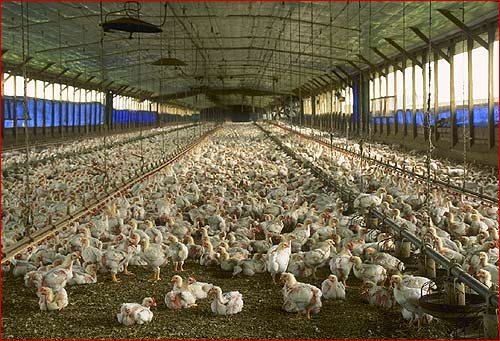Here’s a simple question with lots of answers: you have a large population of humans who need food to live, some of which has to be protein. How do you produce the food?
The answer, from the point of view of our “civilized” human culture is based upon gaining maximum protein output at minimum cost, taking advantage of huge economies of scale and a complete lack of concern for the welfare of anything. That’s why we have battery farming.
It’s easy to say, “but we need cheap food because many people don’t have much money.”
Bullshit.
For a start, humans in the industrialised west eat far more protein than they need on average, and global food shortages have little, if anything to do with the local availability of food – they are largely the result of a global food production and distribution system that exploits land, people and animals to make profit. Food, one of the fundamental necessities of life, and people make PROFIT out of even the most basic requirements – that is absurd, bordering on the criminal.
Yet farmers throughout the world, and increasingly the multinational food companies and supermarket giants, claim that cheap food has to come at the expense of welfare, thus committing millions upon millions of animals to a short life of intense misery because of the perceived notion that this is the only way to run a food system.
This leads on to my second point, which is that the food industry is predecated on the assumption that meat is a necessary form of protein. Yes, people have eaten meat ever since there were people, and I would never begrudge someone their desire to eat meat so long as they are comfortable with the slaughter process, but it is the industrial west that dominates the world food markets – putting the lie to the contention that meat is a necessary staple food item. In the least industrialised parts of the world, meat consumption averages around 13% of total calories, whereas in industrialised countries as a whole the percentage of meat calories is 28%.
There are signs that some change is taking place, but its success depends both on the extent of change that people are prepared to commit to, and the level of availability of alternatives. Battery eggs in the UK are mainly contained in processed foods, but the average supermarket stocks a majority of “free range” eggs (those laid by chickens that have at least the opportunity to go outside for a bit); free range, and organic meat (organic implies a better standard of welfare than mere free range) is widely available to the general public – I was about to write “albeit at a premium”, but realised that this would imply a problem, which is clearly not so as we should pay a fair price for food based on its real production costs; and the debate is happening across the world as to the validity of continuing the current barbaric farming practices.
Widely recognised chefs like Jamie Oliver, Hugh Fearnley-Whittingstall and Raymond Blanc (who goes further with sustainability than most) have made the issue something that won’t go away as long as we care about what we eat, but that brings up a second question, that goes to the root of the problem, and needs to be asked incessantly:
Do we care about the food we put in our mouths?
At the moment it seems as thought we don’t, but if you care then acting on that could really change how our food is made.
